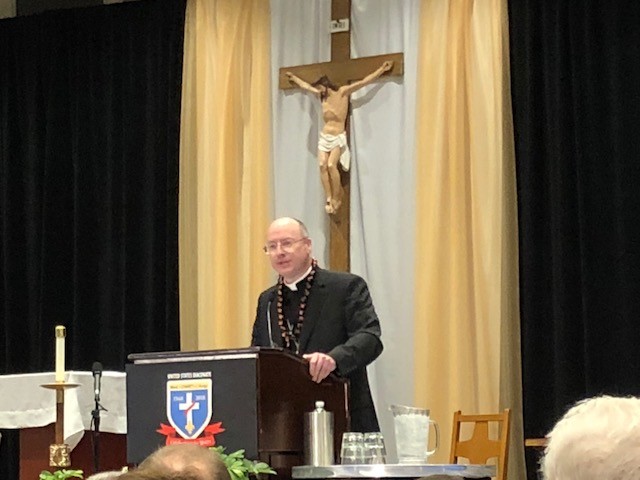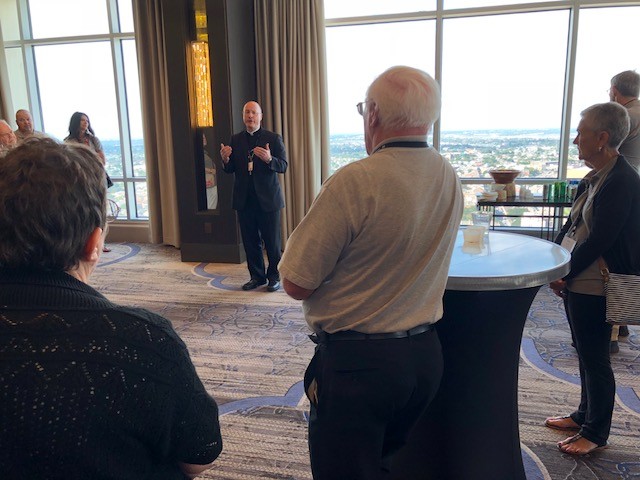UPDATED: Bishop McKnight addresses nation’s deacons
Speaks to 3,000 at National Diaconate Congress in New Orleans Tells them to forge new bonds between the Church and people on the peripheries More than 40 from J.C. diocese attend

A full 50 years after permission was given to bring the Roman Catholic order of deacon back to life in the United States, it remains a work in progress.
“We are still in the initial stages of reestablishing the permanent diaconate. Humble patience is what is needed,” Bishop W. Shawn McKnight told about 3,000 deacons, deacon candidates and members of their families.
He spoke at a plenary gathering during the 2018 National Diaconate Congress, held July 22-26 in New Orleans.
More than 40 people from this diocese attended, including deacons, deacon candidates, wives, and Father Daniel Merz, diocesan director of the permanent diaconate.
The theme was “Christ the Servant: Yesterday, Today and Forever.”
“I came back from New Orleans with a renewed pride in my ministry as a deacon, optimistic about the future of the diaconate in our diocese,” stated Deacon Edward Stroesser of St. Andrew parish in Holts Summit.
“It was powerful to see so many deacons, candidates and wives gathered together for this special celebration of thanks and continuance and direction, that we might move forward in our individual and collective ministries,” said Deacon Raymond Purvis of Immaculate Conception parish in Jefferson City, diocesan coordinator of the Office of Deacon Formation.
A century at a time
Bishop McKnight has studied and written extensively about the interwoven theology, history and sociology of the order of deacon. He is author of a recently published book, Understanding the Diaconate.
In a talk punctuated with laughs and candid observations, he gave an overview of the Church’s evolving insights into the diaconate and the proper role for deacons.
He believes a good understanding of the diaconate goes hand-in-hand with a healthy perspective of the Church and the sacrament of holy orders.
“If you get the diaconate right, everything else about the Church seems to just fall into place,” he said.
He noted that throughout history, it has taken 100 years or more for the Church to fully implement the directives of each ecumenical council.
The most recent of these, Second Vatican Council, concluded 53 years ago.
“There is no reason why we should think that the implementation of Vatican II will take any less time (than the others),” he said.
The fathers of that council beckoned the People of God toward new openness and engagement with the modern world, and summoned a mostly passive laity into full, active and conscious participation in the everyday life of the Church.
They also called for the restoration of the ancient order of deacon to help accomplish that.
“We should be in absolute awe of how much the Holy Spirit has accomplished in our Church and with the diaconate since the close of the last session of the Second Vatican Council,” said Bishop McKnight.
But the work, he insisted, is nowhere near finished.
“Always on the move”
The diaconate was born out of great need in Apostolic Times. It flourished in the early Church and reached its apex of influence and responsibility in the third and fourth centuries before all but fading away in the early Middle Ages.
Bishop McKnight spoke at length about the contributions of Pope St. John XXIII (+1958-63), whom he referred to as the “Grandfather of the Modern Diaconate”; Blessed Pope Paul VI (+1963-78), “The Father of the Modern Diaconate”; Pope St. John Paul II (+1978-2005), “The Philosopher Pope”; Pope Emeritus Benedict XVI (+2005-13); and Pope Francis.
“They were the most significantly responsible for shaping the diaconate as we have it today,” said Bishop McKnight.
He said never to lose sight of how the restored diaconate fits into Vatican II’s larger vision of a Church that is missionary, evangelical, outward-focused and tuned into the current age.
He believes a passage from “Ad Pascendum,” Blessed Pope Paul’s 1972 apostolic letter presenting norms for the diaconate, is essential to understanding the order’s purpose:
“The permanent diaconate should be restored as an intermediate order between the higher grades of ecclesial hierarchy and the rest of the People of God, being as it were an expression of the needs and desires of the Christian communities, an animator of the service of diaconaia of the Church among the local Christian communities, and a sign or sacrament of Christ the Lord Himself, Who came not to be served but to serve” (Bishop McKnight’s translation of a passage from “Ad Pascendum”).
“Service sacramentalized”
The diaconate, the bishop noted, is defined in terms of relationships — between the ordained and the laity, and between the Church and all who have yet to become part of it.
As with the order of priests and of bishops, the diaconate is less about individual deacons than about the entire Church.
“We ordain a man to the diaconate, priesthood or episcopate, not because the man personally needs it to be saved — baptism is the only sacrament necessary for salvation — but because the communion of the Church, the holiness of the Church, demands it,” he said.
Through official Church documents and the Catechism of the Catholic Church, as well as instructive teaching, Pope St. John Paul II helped codify the role of the deacon in Church law.
He told a gathering of deacons during his 1987 visit to the United States: “The service of the deacon is the Church’s service sacramentalized. You are meant to be living signs of the servanthood of Christ’s Church.”
Pope Benedict helped refine the theological precision of the Church’s teaching on the role and identity of the deacon as a bridge between ordained leaders and the laity.
Bishop McKnight summed up the distinction Pope Benedict helped clarify: “Neither a priest-shepherd nor simply another member of the flock, the deacon is uniquely positioned to serve the communion of the Church by serving the bond of communion between the flock and its shepherd, and by reinforcing and vivifying the solidary that exists between Christian community and those in need.”
A call for creativity
Bishop McKnight noted that Pope Francis has written little magisterially about the diaconate.
“And yet, no other Pope has drawn more attention to the need for the Church to reach out to the margins and accompany those who thirst for the springs of salvation,” the bishop stated.
The Pope has urgently asserted that the Church cannot wait for people to come and be ministered to; it must run out to the fringes of society and be light to people who have no hope.
Bishop McKnight believes that for the diaconate to reach its full potential, the entire Church must continue to become more outward-focused.
He asked: “If the diaconate is about helping priests and bishops be closer to their flock, and for the People of God to be closer to those on the periphery in a missionary style of evangelization, then how successful can the diaconate be if the Church is stuck in a style of evangelization that is maintenance-oriented with lots of ‘you-come-in-ism,’ rather than ‘we go out to you’?”
Bishop McKnight believes the level of success deacons have in animating the faithful to connect with people on the margins is a good indicator of a parish’s or diocese’s adherence to its mission.
“In helping pastors to ‘smell like the sheep,’ deacons uniquely serve the community Church like no one else can,” he stated. “So we need a lot more imagination and creativity with deacons.”
“Shrink the chasm”
Deacons from this diocese who attended the congress said they came back with strength and inspiration to be heralds of the Gospel in new ways, especially to people on the margins.
“Being constantly reminded to go where the people are gave me some ideas about some new approaches to evangelizing,” stated Deacon James Haaf of St. Francis Xavier parish in Taos.
“I feel a stronger call to be a true ‘minister’ in addressing the needs of others, not just people in the parish,” said Deacon Thomas Whalen of St. Peter parish in Jefferson City. “There are many other people in need of God’s loving care, including those who need evangelization — those who have strayed from the faith, as well as those who have never really heard or understood the truth of Jesus’ love and His teachings.”
Deacon Stroesser and Deacon John Neudecker of St. Peter parish in Fulton were also impressed by Cardinal Joseph Tobin’s talk, in which he called on deacons to help “shrink the chasm between faith and life.”
Deacon Purvis said it was powerful to be together with so many other deacons and their wives, as well as Archbishop Chrisophe Pierre, Pope Francis’ delegate to the United States; Cardinal Daniel N. DiNardo, chairman of the U.S. Conference of Catholic Bishops; and numerous other bishops and archbishops, priests and laypeople taking part as presenters and participants.
“A common theme I took note of was that the order of the diaconate is an intermediate order, one meant to serve as an intermediary between the bishop, his priests and the laity,” he said.
Direction and support
Deacon Dan Joyce of Cathedral of St. Joseph parish in Jefferson City, interim president of Fr. Tolton Regional Catholic High School in Columbia, said it was gratifying to spend time with such a large contingent of deacons and deacons’ wives from the United States and many foreign countries.
“What I brought back from New Orleans is a stronger attachment to our diaconate mission of service and charity to not only our assigned home parishes, but to all the people of our diocese as representatives of our local bishop in discerning their needs and helping to get those needs addressed,” he said.
He said the support shown for diaconate ministry by national Church leaders, including bishops, archbishops and well-known deacon scholars and commentators was palpable.
Deacon Francis Butel of St. Martin parish in St. Martins — a member of the first class of deacons to be ordained for this diocese in 1977 — came away from Bishop McKnight’s talk with a wealth of insights and reminders.
Among these are that deacons must be: the face of the Church to those in need; at the forefront for formation for Catholic social teachings; coordinators of charities and mercy; involved in the pastoral care of the family; and a bridge between the shepherd and the sheep.
Also of interest to him were the bishop’s statements that deacons may be administrators of parishes to assist the pastor but should never be mistaken for filling the role of the priest; and that deacons are “a good buy” — although few receive a salary, deacons do great work for the Church.
“Bishop McKnight is listening, not rushing into the plans for the diaconate,” Deacon Butel noted. “There will be more reaching out to the fringes and underdeveloped ministries.”
Comments
Other items that may interest you
Services
The Catholic
Missourian
2207 W. Main St.
Jefferson City MO 65109-0914
(573) 635-9127
editor@diojeffcity.org







